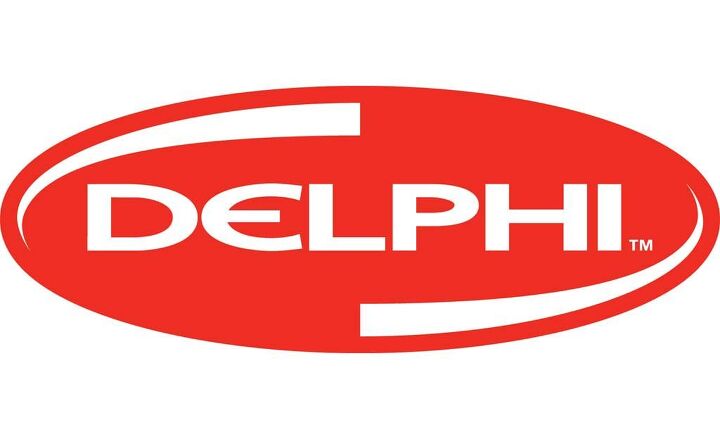Did Obama Administration Help Delphi Evade U.S. Taxes?

From Bloomberg’s Zachary Mider comes a new allegation regarding the restructuring of (formerly) American parts maker Delphi: the Treasury Department under Obama helped the company re-incorporate in England as part of a tax avoidance strategy. If that’s true, it’s an embarrassing revelation for a President who recently condemned American companies that incorporate abroad as “corporate deserters.” Like many things in the financial world, however, appearances are often deceiving.
As Mider explains, Delphi was spun off from GM in 1999 in an attempt to diversify the part’s division’s clientele and make it more globally competitive. The move didn’t pan out; by 2005 Delphi was in bankruptcy court, where it scraped along until the 2009 financial crisis. The Great Recession made Delphi’s situation acute; if GM collapsed, the parts company had no hope of surviving. Conversely, GM needed the company to keep supplying it with crucial parts. After the bailout package for GM was approved in the waning days of the Bush Administration, Treasury officials understood that Delphi would need to be recapitalized as well. Steven Rattner, the Wall Streeter appointed by President Obama to oversee the bailout of GM, helped broker a deal to “fix” Delphi by getting the company out of bankruptcy court.
Initially, the hedge fund Platinum Equity LLC of Los Angeles agreed to divvy up Delphi’s assets with GM, with the newly Treasury-backed carmaker providing the majority of the financing (Treasury money) for the deal. However, the agreement with Platinum fell through when another one of Delphi’s creditors, the hedge fund Elliot Management, objected to the terms of the deal. Elliot and the firm Silver Point Capital partnered to put together their own bid for Delphi, which GM agreed to. GM invested $1.7 billion into Delphi’s equity, and bought out its steering parts business and a few factories for a further $1.1 billion. All of this money came from an escrow account filled with $16 billion in bailout money set up after GM emerged from bankruptcy, and all the spending required Treasury Department approval before it could go forward. There was one small catch in the fine print of the deal: GM and the hedge funds would reincorporate Delphi in some foreign country, ostensibly to obtain a better tax position. Mider explains that this practice, known as “inversion,” is becoming increasingly common amongst U.S.-based companies seeking a more favorable tax climate. Delphi was incorporated in England for that purpose, and the money was disbursed from the Treasury escrow account after the reincorporation was complete. The original agreement with Platinum didn’t contain language about foreign reincorporation, although it later emerged that the fund’s lawyers had set up two paper companies in Luxembourg for that purpose.
The deal between Elliot, Silver Point, and GM to rescue Delphi turned out to be a great investment for all parties involved. After Delphi went public again in 2011, the stock price surged. GM sold its stake back to Delphi for a $1.6 billion profit, and Elliot Management booked $1.3 billion on an initial investment of $300 million. At this point, GM was under no obligation to pay the Treasury anything. The terms of the bankruptcy meant that all of the Treasury’s debt had been swapped for equity in the “new” carmaker. The U.S. Government wouldn’t see a dime of GM’s profits from the Delphi deal, besides any increase in the market value of its equity stake. And it had been cut out of a large chunk of the tax revenue from Delphi, which was now headquartered in England under more favorable rules.
The question becomes who knew what, when, and how much leverage the Treasury had to exert on the terms of the deal with Elliot and Silver Point. The time window for the agreement is key. GM’s bankruptcy proceedings concluded on July 10, 2009. Steven Rattner and the rest of the bailout task force stepped aside, believing their jobs were finished. But the collapse of the Platinum deal happened soon afterwards, because some of Delphi’s creditors weren’t satisfied with the terms. The deal between Elliot, Silver Point, and GM was inked on July 26. When interviewed by Bloomberg, Rattner claimed to have no knowledge of any plan to incorporate Delphi in a foreign locale at the time of the original negotiations. Even if he had, it’s not likely that he would have been able to stop it. Because the Treasury never technically held a direct stake in Delphi (unlike its assumption of equity in GM’s case), it was only an indirect party to the final settlement of Delphi’s bankruptcy proceedings. Rattner had denied a $150 million cash infusion from GM to Delphi previously, when it became clear that transfer wouldn’t end Delphi’s bankruptcy proceedings. The Treasury could have rejected disbursement of funds for GM’s investment in the parts maker after the reincorporation of Delphi in England. But that would have iced the deal and put Delphi’s future in jeopardy, which in turn would have been counterproductive to the purpose of the bailout in the first place. Even so, it’s not a proud moment in the management of the bailout by any stretch of the imagination.
The other factor to consider is that Rattner and the bailout task force may have believed that Delphi’s reincorporation wouldn’t affect its tax position after all. Mider reports that in September of 2009, the IRS notified Delphi that it was still considered a U.S. company and would be subject to U.S. corporate income tax rates. As a justification, the IRS cited a 2004 law meant to prevent exactly what Delphi had done: the creation of paper “surrogate foreign corporations” for the purposes of evading taxes. The IRS dispute with Delphi in this case is ongoing. If the company loses its appeal, it would owe about 20 percent more a year in taxes than it pays now (as well as any assessments for back taxes). If that’s the case, then the “inversion” of Delphi will be a moot point.
The broader takeaway from the whole saga is that any intervention by government in the spaces normally served by private equity is bound to have some unpleasant side effects. Simultaneously trying to manage, regulate, and tax a business is bound to produce more than a few conflicts of interest. At the very least, the Delphi deal embarrasses an Administration which has recently sought to turn up the heat on companies moving their headquarters abroad. It’s unlikely to change many minds about the wisdom of the bailout; those lines were drawn firmly some time ago. But the curious case of Delphi’s “inversion” will undoubtedly be cited in future debates about corporate tax reform in America, from both a left and a right-wing perspective.

More by J.Emerson
Latest Car Reviews
Read moreLatest Product Reviews
Read moreRecent Comments
- Bd2 Lexus is just a higher trim package Toyota. ^^
- Tassos ONLY consider CIvics or Corollas, in their segment. NO DAMNED Hyundais, Kias, Nissans or esp Mitsus. Not even a Pretend-BMW Mazda. They may look cute but they SUCK.I always recommend Corollas to friends of mine who are not auto enthusiasts, even tho I never owed one, and owned a Civic Hatch 5 speed 1992 for 25 years. MANY follow my advice and are VERY happy. ALmost all are women.friends who believe they are auto enthusiasts would not listen to me anyway, and would never buy a Toyota. They are damned fools, on both counts.
- Tassos since Oct 2016 I drive a 2007 E320 Bluetec and since April 2017 also a 2008 E320 Bluetec.Now I am in my summer palace deep in the Eurozone until end October and drive the 2008.Changing the considerable oils (10 quarts synthetic) twice cost me 80 and 70 euros. Same changes in the US on the 2007 cost me $219 at the dealers and $120 at Firestone.Changing the air filter cost 30 Euros, with labor, and there are two such filters (engine and cabin), and changing the fuel filter only 50 euros, while in the US they asked for... $400. You can safely bet I declined and told them what to do with their gold-plated filter. And when I changed it in Europe, I looked at the old one and it was clean as a whistle.A set of Continentals tires, installed etc, 300 EurosI can't remember anything else for the 2008. For the 2007, a brand new set of manual rec'd tires at Discount Tire with free rotations for life used up the $500 allowance the dealer gave me when I bought it (tires only had 5000 miles left on them then)So, as you can see, I spent less than even if I owned a Lexus instead, and probably less than all these poor devils here that brag about their alleged low cost Datsun-Mitsus and Hyundai-Kias.And that's THETRUTHABOUTCARS. My Cars,
- NJRide These are the Q1 Luxury division salesAudi 44,226Acura 30,373BMW 84,475Genesis 14,777Mercedes 66,000Lexus 78,471Infiniti 13,904Volvo 30,000*Tesla (maybe not luxury but relevant): 125,000?Lincoln 24,894Cadillac 35,451So Cadillac is now stuck as a second-tier player with names like Volvo. Even German 3rd wheel Audi is outselling them. Where to gain sales?Surprisingly a decline of Tesla could boost Cadillac EVs. Tesla sort of is now in the old Buick-Mercury upper middle of the market. If lets say the market stays the same, but another 15-20% leave Tesla I could see some going for a Caddy EV or hybrid, but is the division ready to meet them?In terms of the mainstream luxury brands, Lexus is probably a better benchmark than BMW. Lexus is basically doing a modern interpretation of what Cadillac/upscale Olds/Buick used to completely dominate. But Lexus' only downfall is the lack of emotion, something Cadillac at least used to be good at. The Escalade still has far more styling and brand ID than most of Lexus. So match Lexus' quality but out-do them on comfort and styling. Yes a lot of Lexus buyers may be Toyota or import loyal but there are a lot who are former GM buyers who would "come home" for a better product.In fact, that by and large is the Big 3's problem. In the 80s and 90s they would try to win back "import intenders" and this at least slowed the market share erosion. I feel like around 2000 they gave this up and resorted to a ton of gimmicks before the bankruptcies. So they have dropped from 66% to 37% of the market in a quarter century. Sure they have scaled down their presence and for the last 14 years preserved profit. But in the largest, most prosperous market in the world they are not leading. I mean who would think the Koreans could take almost 10% of the market? But they did because they built and structured products people wanted. (I also think the excess reliance on overseas assembly by the Big 3 hurts them vs more import brands building in US). But the domestics should really be at 60% of their home market and the fact that they are not speaks volumes. Cadillac should not be losing 2-1 to Lexus and BMW.
- Tassos Not my favorite Eldorados. Too much cowbell (fins), the gauges look poor for such an expensive car, the interior has too many shiny bits but does not scream "flagship luxury", and the white on red leather or whatever is rather loud for this car, while it might work in a Corvette. But do not despair, a couple more years and the exterior designs (at least) will sober up, the cowbells will be more discreet and the long, low and wide 60s designs are not far away. If only the interiors would be fit for the price point, and especially a few acres of real wood that also looked real.


































Comments
Join the conversation
Excellent article.
Yep, the Elliott vultures running Delphi bent the Obama administration over a barrel and made BANK on their initial investment. "You want to rescue GM? Give us what we want or have fun building cars without steering columns." The administration caved completely. These are the same guys currently holding Argentina hostage over their defaulted bonds. And in a delicious little bit of serendipity, a certain Mrs. Ann Romney had a big investment in Elliott during this time, meaning that Ann and Mittens likely made millions on the bailout. This was likely one of the reasons Mitt refused to release all his tax returns. Google "Mitt Romney's Bailout Bonanza" for more detail.